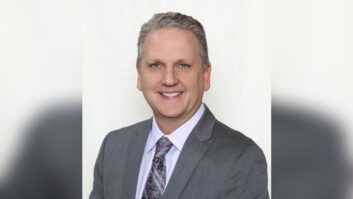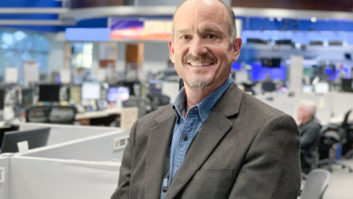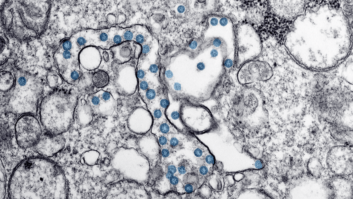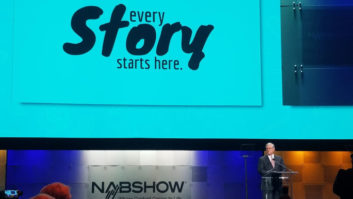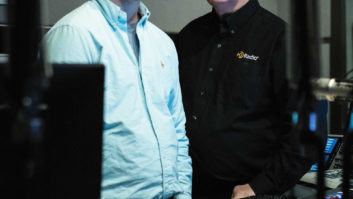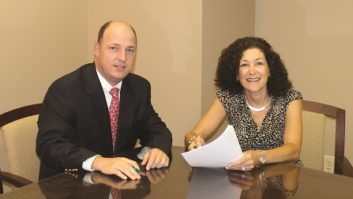
Radio is certainly in George Beasley’s blood. He launched his first station, 500-watt WPYB(AM), in 1961 in Benson, N.C., while working as an assistant principal at a public high school. Beasley worked evenings and weekends in radio until 1969; by then he was a principal, but he left his job to devote his attention to radio. It was a good decision; today, Beasley Media Group Inc., a subsidiary of Beasley Broadcast Group, owns and operates 52 radio stations (34 FM and 18 AM) in 12 large and mid-size U.S. markets.
On Wednesday, Sept. 30, the chairman, CEO and founder of Beasley Broadcast Group will receive the National Radio Award at the Radio Show in Atlanta.
REACH AND CASH FLOW
The fact that George Beasley has been in radio for more than five decades has not dimmed his love for the industry nor his passionate belief in its future.
Asked whether he would make the same decision to invest in radio today as he did in 1961, Beasley replied, “I would, because radio continues to maintain its weekly listenership base of 90-plus percent of Americans age 12 or older, a level which has not changed much over the past decade. As an investment, radio valuations today are not demanding; and with a disciplined approach to operations and the delivery of great local content, radio still delivers excellent cash flow.”
Radio’s continuing strength among young listeners is well documented, Beasley said; this important fact is discounted by the industry’s nay-sayers but remains true nevertheless.

Husband and wife: George and Ann Beasley in a photo circa early 1970s.
“Research continues to show that when asked, 14- to 24-year-olds indicate that they have actually increased their time spent listening to radio,” he said. “Radio can compete effectively against pure streamers, satellite and iPods; and HD is a great medium for doing so and recapturing listening growth in youth and other demos.”
To bolster his argument that radio remains relevant in the digital age, George Beasley cited AT&T’s decision to include FM chip activation in its 2016 Android smartphone device specifications, and a subsequent announcement from NextRadio that T-Mobile plans a similar move.
“Initially, their customers will be the biggest beneficiaries of this decision as they will have access via their smartphones to local radio news, entertainment, weather and failsafe emergency alert connectivity,” said Beasley. “Furthermore, with access to certain apps, their listeners will enjoy song tagging and interactivity features that have become increasingly popular with younger listeners.”
As for the general notion that radio broadcasting is being overwhelmed by the many features of Web-based streaming media, he dismisses the idea as a fallacy and argues that radio’s value proposition remains as solid as it was 50 years ago.

George Beasley’s first radio station.
“In terms of the two primary constituents served by radio, listeners enjoy crystal-clear, free broadcasts of their favorite entertainment, news, weather, sports, traffic and other local content, while advertisers benefit from the ability to cost-effectively reach any and all consumer target demographics,” Beasley said.
“Radio’s still a great place to be … As FM chips proliferate in smartphones, our younger demo listeners will be an even bigger and more important part of our overall listener base — this ties in to our ‘local’ advantage as well as consumers’ desire for everything digital.”
EARLY ADOPTER
Keeping up with all this change is a big challenge for any radio broadcaster. But for George Beasley, change has always been a big part of radio.
“I am proud to say that Beasley has been a pioneer in the adoption of technologies such as FM radio, which surpassed AM in the late 1970s; HD Radio and PPM in the ensuing decades; and streaming and mobile applications today.

George Beasley is surrounded by 2015 company award winners and family members: Rear, from left: DOS AJ Lurie (SW Florida); VP Market Manager Brad Beasley (SW Florida); EVP Operations Brian Beasley; VP Market Manager Bruce Simel (Eastern NC); President and COO Bruce Beasley; VP Finance Marie Tedesco; VP Market Manager Tom Humm (Las Vegas); VP Digital Product Development Kimberly Sonneborn; VP Engineering and CTO Mike Cooney; VP Programming Justin Chase. Front: EVP and CFO Caroline Beasley; Chairman/CEO George G. Beasley; Digital Content Manager Diana Beasley (SW Florida); Chief Revenue Officer Heather Monahan; VP Corporate Communications Denyse Mesnik.
“Each of these innovations enhanced the listener experience and strengthened the medium as a core buy for any brand or product seeking to reach consumers at large or consumers within distinct demographics.”
The company patriarch is not inclined to rest on his considerable laurels. In terms of Beasley Media Group, “our immediate focus is on completing the integration of the CBS stations we swapped for last December, optimizing their operations and serving the communities and listeners where we now operate.” That deal sent 14 CBS stations to Beasley — in Tampa/St. Petersburg, Fla., Charlotte, N.C., and Philadelphia — for return for five of Beasley’s: two in Philadelphia and three in Miami.
“At the same time, we’ll also continue to prioritize our successful debt and leverage reduction initiatives.” The company, which went public in 2000, has long articulated a strategy of identifying and acquiring under-performing radio stations in growth markets, according to its website. It calls itself “the oldest, continuously managed, publicly traded, pure-play radio broadcaster in the country.”
As for the radio industry as a whole? “Looking out today and into the future, we must recognize that the social, economic, technological and industry landscapes have changed and that to thrive in this evolving environment we must change as well, while continuing to play to our core, perpetual strengths.
“AN HONORABLE LEGACY”
In announcing the selection of George G. Beasley to receive the National Radio Award, NAB Executive Vice President of Radio John David cited his “entrepreneurial spirit and passion for our business,” and called him a true family broadcaster. (Four of Beasley’s five children joined the company as employees: Bruce, Brian, Caroline and Brad Beasley.)
Beasley, who began his broadcasting career in the Blue Ridge Mountains of North Carolina and Virginia, holds a Bachelor of Science, Master of Arts and honorary Doctor of Humane Letters degrees from Appalachian State University; he is a member and past chairman of the Appalachian State University Foundation board. ASU’s media campus in Boone, N.C., is named after him.
He has been honored by the Library of American Broadcasting as one of the “Giants of Broadcasting” in 2012. He served on the board of the North Carolina Association of Broadcasters, received its Distinguished Service Award and is in its hall of fame; he has also received notable honors from broadcast associations in Nevada and Florida. The company’s headquarters are now in Naples, Fla. See a company history, including an overview of notable stations acquisitions and corporate moves, athttp://bbgi.com/our-story.
“These six strengths are emphasizing radio’s localness; developing station personnel and management teams and keeping them informed; exercising cost disciplines; securing radio’s share of online ad spending growth and monetizing online listening; harnessing the value of HD investments and the promise of the technology; and ensuring that PPM and overall measurement accurately values the immense use of the medium.”
He expressed gratitude for the National Radio Award. “In three words: I am honored. Any award bestowed upon you by your peers carries special significance, and I believe it reflects my passion for the medium and the passion for radio we’ve instilled throughout our organization.”
He is also insistent on sharing credit with his Beasley Media Group colleagues. “I’d like to acknowledge the essential role my senior management team and corporate staff have played in creating and shaping our culture while helping to develop winning operational philosophies and strategies,” said Beasley. “I’d also like to thank our general managers and their respective teams for adopting our goals for growth and taking actions on a daily basis that have improved our competitiveness, the content we bring to listeners and the value we deliver to advertisers.”






